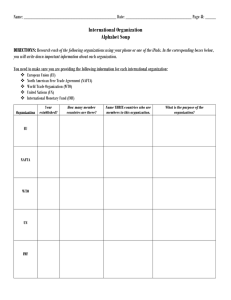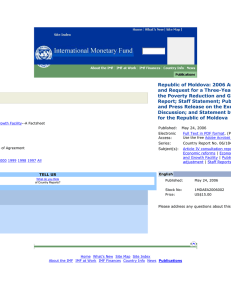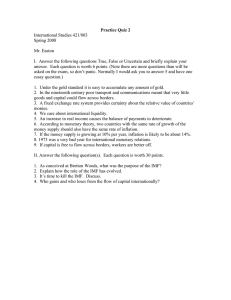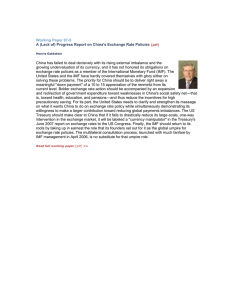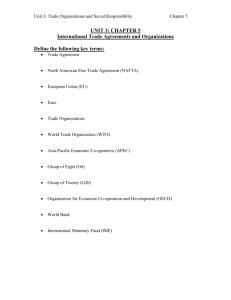Could the financial crisis have been avoided?
advertisement
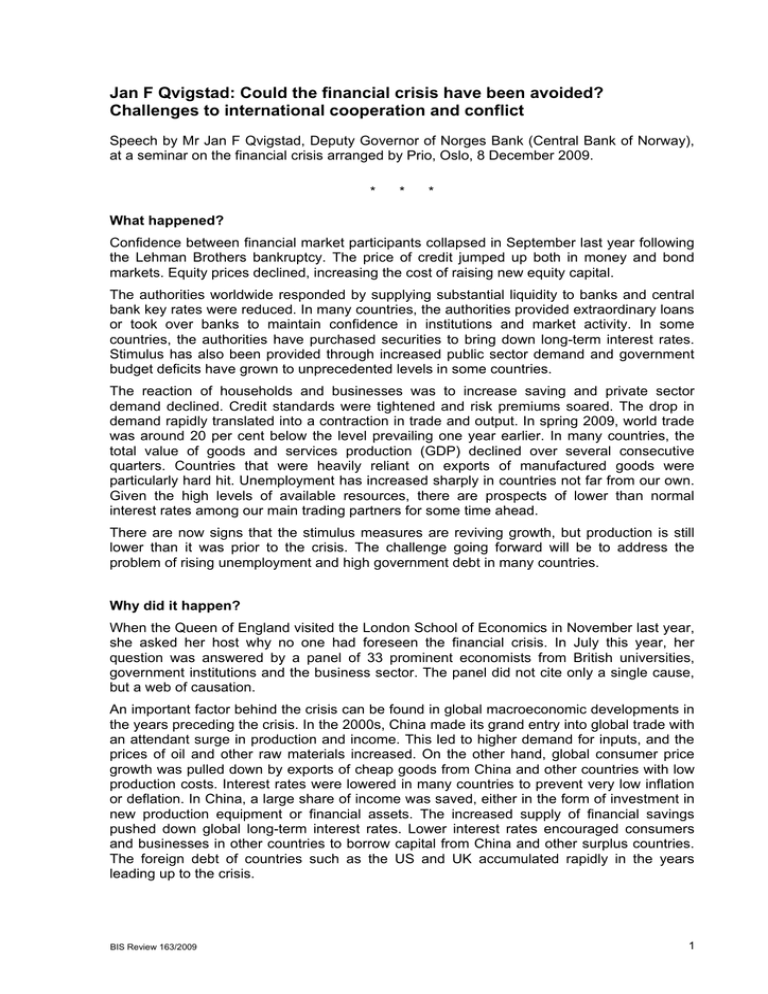
Jan F Qvigstad: Could the financial crisis have been avoided? Challenges to international cooperation and conflict Speech by Mr Jan F Qvigstad, Deputy Governor of Norges Bank (Central Bank of Norway), at a seminar on the financial crisis arranged by Prio, Oslo, 8 December 2009. * * * What happened? Confidence between financial market participants collapsed in September last year following the Lehman Brothers bankruptcy. The price of credit jumped up both in money and bond markets. Equity prices declined, increasing the cost of raising new equity capital. The authorities worldwide responded by supplying substantial liquidity to banks and central bank key rates were reduced. In many countries, the authorities provided extraordinary loans or took over banks to maintain confidence in institutions and market activity. In some countries, the authorities have purchased securities to bring down long-term interest rates. Stimulus has also been provided through increased public sector demand and government budget deficits have grown to unprecedented levels in some countries. The reaction of households and businesses was to increase saving and private sector demand declined. Credit standards were tightened and risk premiums soared. The drop in demand rapidly translated into a contraction in trade and output. In spring 2009, world trade was around 20 per cent below the level prevailing one year earlier. In many countries, the total value of goods and services production (GDP) declined over several consecutive quarters. Countries that were heavily reliant on exports of manufactured goods were particularly hard hit. Unemployment has increased sharply in countries not far from our own. Given the high levels of available resources, there are prospects of lower than normal interest rates among our main trading partners for some time ahead. There are now signs that the stimulus measures are reviving growth, but production is still lower than it was prior to the crisis. The challenge going forward will be to address the problem of rising unemployment and high government debt in many countries. Why did it happen? When the Queen of England visited the London School of Economics in November last year, she asked her host why no one had foreseen the financial crisis. In July this year, her question was answered by a panel of 33 prominent economists from British universities, government institutions and the business sector. The panel did not cite only a single cause, but a web of causation. An important factor behind the crisis can be found in global macroeconomic developments in the years preceding the crisis. In the 2000s, China made its grand entry into global trade with an attendant surge in production and income. This led to higher demand for inputs, and the prices of oil and other raw materials increased. On the other hand, global consumer price growth was pulled down by exports of cheap goods from China and other countries with low production costs. Interest rates were lowered in many countries to prevent very low inflation or deflation. In China, a large share of income was saved, either in the form of investment in new production equipment or financial assets. The increased supply of financial savings pushed down global long-term interest rates. Lower interest rates encouraged consumers and businesses in other countries to borrow capital from China and other surplus countries. The foreign debt of countries such as the US and UK accumulated rapidly in the years leading up to the crisis. BIS Review 163/2009 1 Historically low interest rates prompted fund managers in Western countries to seek out new alternatives in their search for high yields. New financial savings products were developed and spread to investors around the world. It was often difficult, or even impossible, for investors to value the risk underlying the products. Yield potentials can also be increased by leveraging securities purchases. As long as prices rise, the return on equity will increase with the degree of leveraging. On the other hand, the risk of being left with debt, and little or no equity capital, increases when prices fall. In the years ahead of the crisis, high debt leveraging still appeared to be an attractive proposition in an environment of low credit risk and a glut of cheap credit. The result was a surge in debt accumulation in the years preceding the crisis. Prices in securities and property markets soared. The build-up of macroeconomic imbalances in the years prior to the crisis increased vulnerabilities and the potential amplitude of a downswing. Many observers warned of the risks associated with these developments but no one foresaw how the crisis would unfold, when it would erupt, or its severity. The global financial crisis has revealed weaknesses in the financial system. In retrospect, it is clear that financial sector regulation was not adequate. Regulation was primarily designed to ensure that individual banks had sufficient equity capital to protect lenders and depositors against losses, rather than ensuring stability in the system as a whole. For example, there were no requirements stipulating the size of liquid assets a bank must hold to weather periods of failure in market funding. Nor were there any minimum requirements as to funding stability. An example of the importance of these conditions is the collapse of the British bank Northern Rock in September 2007. The bank had a residential mortgage portfolio that was not particularly exposed to risk. The bank had, however, expanded rapidly over several years, an expansion that was partly based on short-term market funding. When funding markets failed, the bank promptly encountered liquidity problems and was compelled to turn to the Bank of England for support. When it became known that the bank had sought government support, depositors quickly lost confidence and the UK experienced its first bank run since 1866. Many other banks that were considered to be solid under the applicable regulation also encountered problems when financial market confidence evaporated. Something worked: the IMF, G20 and WTO The IMF is an organisation for international cooperation based on a system of mutual assistance among member countries. The IMF provides loans to countries experiencing balance of payments problems. The loans are financed by member countries. If the problems stem from economic policy mismanagement, the loan will be subject to specific requirements such as measures to correct policy. When the crisis occurred, the IMF reacted swiftly to accommodate the increased need for IMF services. The IMF’s role as lender and interlocutor with the authorities in crisis-hit countries probably helped to limit the crisis. The IMF provided support and assistance to countries that were directly affected by the crisis and countries that were innocent bystanders. The sharp increase in IMF lending reduced the financial resources of the organization. Member countries have now increased their contributions to the IMF. During the financial crisis, the G20 has played a prominent role in the international coordination of economic policy. The group launched several important initiatives during the crisis, which were subsequently placed under the responsibility of the IMF. All countries stand to benefit from the establishment of international meeting places that the major economies consider to be of interest. However, unlike the IMF, the G20 is not a representative body for all countries. Even if the G20 account for a large share of global output, most countries are not included, such as low-income countries and regions like most of Africa, the Middle East and the Nordic countries. One possibility is to develop the G20 based on the IMF model where countries are represented through constituencies. Small 2 163/2009 countries like Norway, or at least the Nordic countries, could then be represented in a forum for discussion of the policies of major economies. In the wake of the Great Depression of the 1930s, protectionist measures were introduced in many countries. Customs duties were increased to shield domestic industry. As a result, world trade continued its decline over several years. So far, protectionist policies have been avoided in the wake of the latest crisis, which makes it possible to reverse the sharp contraction in world trade more rapidly and hence reinvigorate economic growth. One reason why the mistakes of the 1930s have not been repeated this time may be that the World Trade Organisation (WTO) was established in the interim. International trade agreements concluded under the auspices of the WTO contribute to binding national governments and prevent protectionist measures. By and large, this has worked well during the recent crisis. Could the crisis have been avoided? The macroeconomic forces that were unleashed in the years leading up to the financial crisis were strong. It is unlikely that a single country could have stemmed the tide. China’s participation in international trade in goods added several hundred million persons to the global workforce over a few years. This increased the room for strong, non-inflationary global growth. China was not prepared, however, to liberalise its capital markets fully. The Chinese government was not willing to allow its currency to float freely and the exchange rate against the US dollar was managed. This disabled an important stabiliser and contributed increasing world trade imbalances. Long-term interest rates remained low in spite of substantial monetary policy tightening in the US between 2004 and 2006. International organisations such as the BIS, OECD, IMF and others noted on more than one occasion that growing imbalances in the world economy were a source of concern. But economic policy decisions are the prerogative of national governments. Given the policy pursued by China, there were probably limits to what monetary policy in Western countries could in reality achieve in terms of rolling back these forces. Increased private saving in the US and other deficit countries would probably have required monetary policy tightening sufficient to push up long-term interest rates. Alternatively, a substantial increase in public sector saving would have been necessary. Both alternatives would probably have led to an economic policy driven downturn. It is demanding to pursue such a policy based on the proposition that a crisis might occur in the future. Improved financial regulation would probably have reduced the severity of the financial crisis. Regulation and insurance have similar features: in most cases an annual premium must be paid in the form of slightly lower growth. This occurs because capital is not allowed to flow entirely freely to the highest yielding vehicles. In return, regulation can counter the build-up of financial imbalances. This reduces the probability that a negative event will trigger a severe financial crisis. It is not optimal to be fully insured against crises because the insurance premium would be too high. But the financial crisis demonstrated that the imbalances ahead of the crisis were unsustainable and that they could have been reduced through regulatory improvements. The reason that this did not occur may be that the risk had taken on the form of several interwoven imbalances that no single authority had the power to correct. Banking and financial market regulation will be enhanced in Norway and abroad. The Basel Committee on Banking Supervision and the Financial Stability Board (FSB), as mandated by the G20, will soon issue recommendations for strengthening regulation of banks’ capital and liquidity management. In the UK, the regulatory authorities have already drawn up new banking regulation. A natural consequence of the financial crisis is that increased weight is given to ensuring system-wide stability and not only the stability of individual banks. Other important questions are whether systemically important banks should be subject to tighter regulation and how to reduce the procyclicality of bank behaviour. BIS Review 163/2009 3 Recommendations from the Basel Committee and the FSB will be examined by national authorities that will subsequently adopt new regulation. In a world with a global financial market, there are limits to how far a single country go it alone. International coordination is important for new regulations to have the intended effect. The crisis has opened a political window for tighter regulation of the financial system, but it is uncertain how long the window will remain open. 4 163/2009

